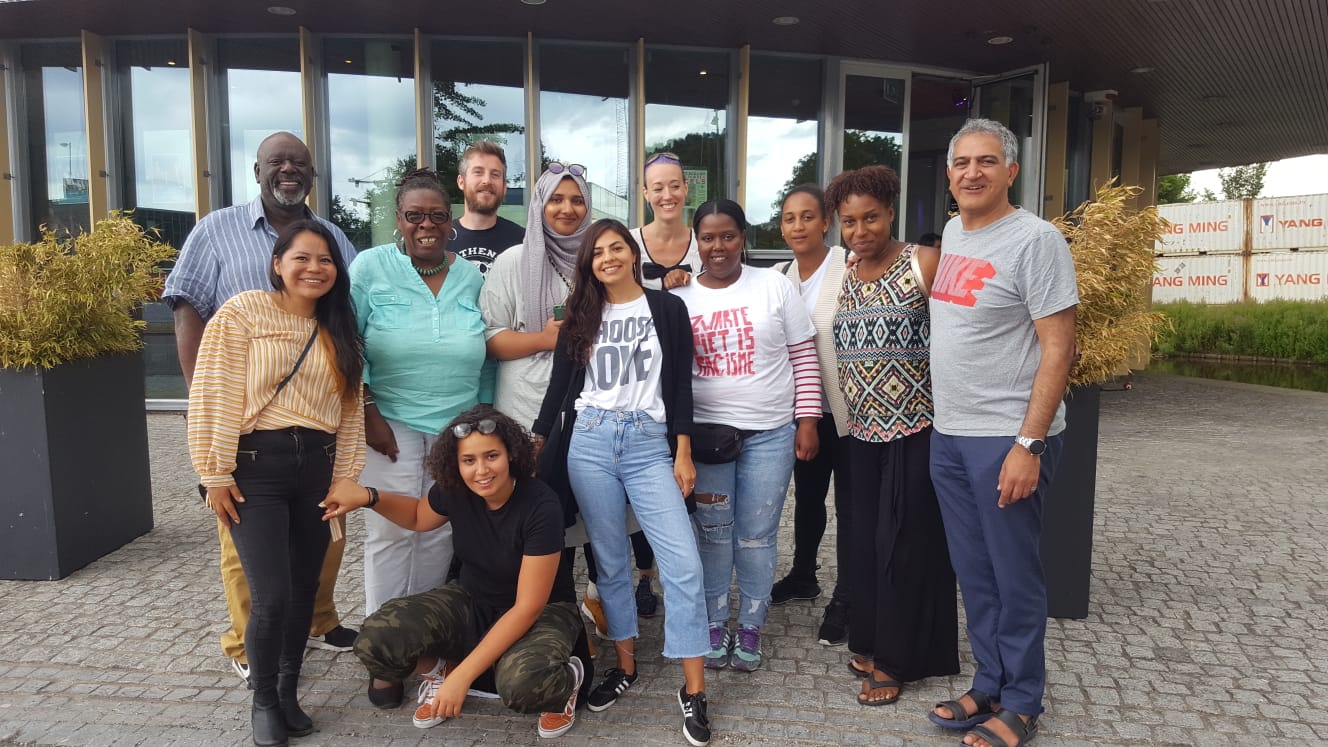


Goldsmiths students and staff (present and past)
From the left: top – Michael Hamilton (a former lecturer on the Turning Point Programme), James MacGregor (student), Naomi Thompson (lecturer), Anabela Semedo (student); middle – Karina Estefania Cuji Morales (student), Yvonne Field (lecturer), Aisha Khan (graduate), Lara Pereira (student), Sireita Mullings (completed her PhD at Goldsmiths), David Woodger (lecturer), bottom – Rajaa Bouchab (commencing at Goldsmiths in September 2018), Yesenia Ramirez (student).
Forty- five people with a range of experience in youth and community work came together from across England – the group included a number of Goldsmiths former, current and future students and staff. Below are reflections and insights from some of the current students that attended the programme.
James MacGregor Born and raised in south London with government policies of multiculturalism, I thought I understood and was aware of racism, and especially so, after studying Race and Identity at Goldsmiths. I recognise now that as a practitioner, I had stagnated, I had spent too much time in my comfort zone. The experience, and exploration of the European black identity jarred me and placed me firmly into new territory, with new emotions.
By the third day of the Ubele programme there was no going back, I knew too much, and even after the distraction of socialising in a large group, with little sleep, I started to process the new information and feelings. My consciousness was shifting and adding a new prospective, I realised late on the fourth night that racism is still dominating people’s lives, that our society uses language and subtle manipulations that work against members of society not considered white.
We are all aware of the racist nature of the past, but are we truly accepting responsibility for the continuing dehumanising of people of colour globally, this needs to be acknowledged and addressed by white people foremost, whites have also never been commodified on such a scale, we have never truly experienced racism from the moment we wake up to the point when we rest are heads.
An invaluable experience that should available to all.
Lara Pereira My experience with the Erasmus+ programme (Introduction to Black Europe) was most valuable and had exceeded my initial expectations. This initiative was vital because it has allowed me to take part of a course, that in normal circumstances it would have been unsustainable, due to its costs.
As a Community Development & Youth Work student at Goldsmiths, University of London and a black European, the personal and professional growth that I was exposed to, is priceless. The Ubele Initiative with the support of Erasmus+ programme, has helped to bridge inequality by enabling students from my background to be part of such programmes. I am looking forward to taking part in other similar programmes similar in the future.
Yesenia Ramirez My experience with the ERASMUS+ programme was much more than what I had expected it to be. Not only did I gain skills and knowledge that I can take back and apply and use in my organisation and community, but I also left with a new sense of awareness and determination.
Systems Thinking for Social change has given me a new insight and perspective on how to work effectively with different communities, and how important integration is in order to be successful in creating change. Systems Thinking is a perspective that allows you to look at underlying dynamics in a system, more so a community and its connections and interactions. I felt that this was important to learn and know as a student studying community development and youth work.
Understanding and knowing how to work with complex systems is vital to create change within it. I have left the programme questioning my own system and how I can positively influence it and ensure diversity. I have left empowered more importantly and with a new sense of confidence to know how to effectively challenge oppressive language and behaviour in any system not just my own. If we want to intervene in a system we need to feel empowered, and that’s exactly what this programme has done. Thank you to Ubele, ERASMUS+ and partners for this opportunity to progress.
Anabela Semedo The programme was very motivational, many of its participant being considered part of “Black Europe” it was a subject that was personal to many. There are many struggles for Black people that were born and raised in Europe, in an era where they suffer racism and discrimination on a constant basis, while on the other hand, being criticised in their own communities for holding “westernised values” and are therefore not able to empathise with their struggles or understand their culture.
It was noticed that many of the participants were quite unaware of the history regarding Black people’s presence in Europe, therefore, many may struggle to challenge inequalities and educate others that are quite resistant to integration.
As the programme was set in a different location (Netherlands) it enabled participants to explore some issues out of their comfort zone, as well as to assimilate many issues and barriers that they also experience in the UK as well as in their community. The Introduction to Black Europe is a very effective method to explore the issues affecting the BME communities as well as un understanding that communities together will have the power to change and educate others including ourselves.
* James, Lara, Yesenia and Anabela are students from Goldsmiths, University of London studying BA in Applied Social Sciences and Community and Youth Work.
Part II of Ubele’s Erasmus+ European Summer School will take place in Berlin between 11th-17th September 2018.